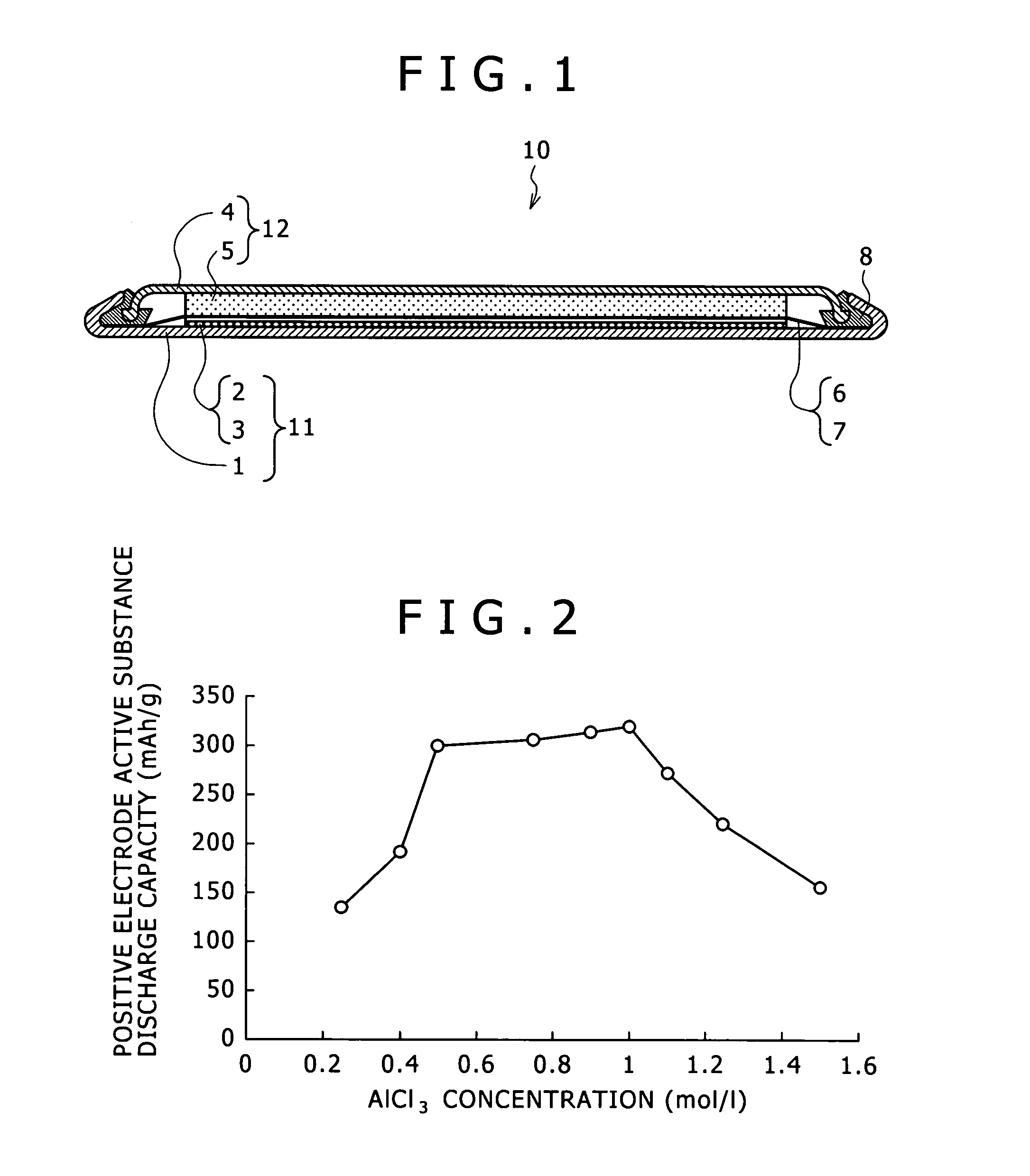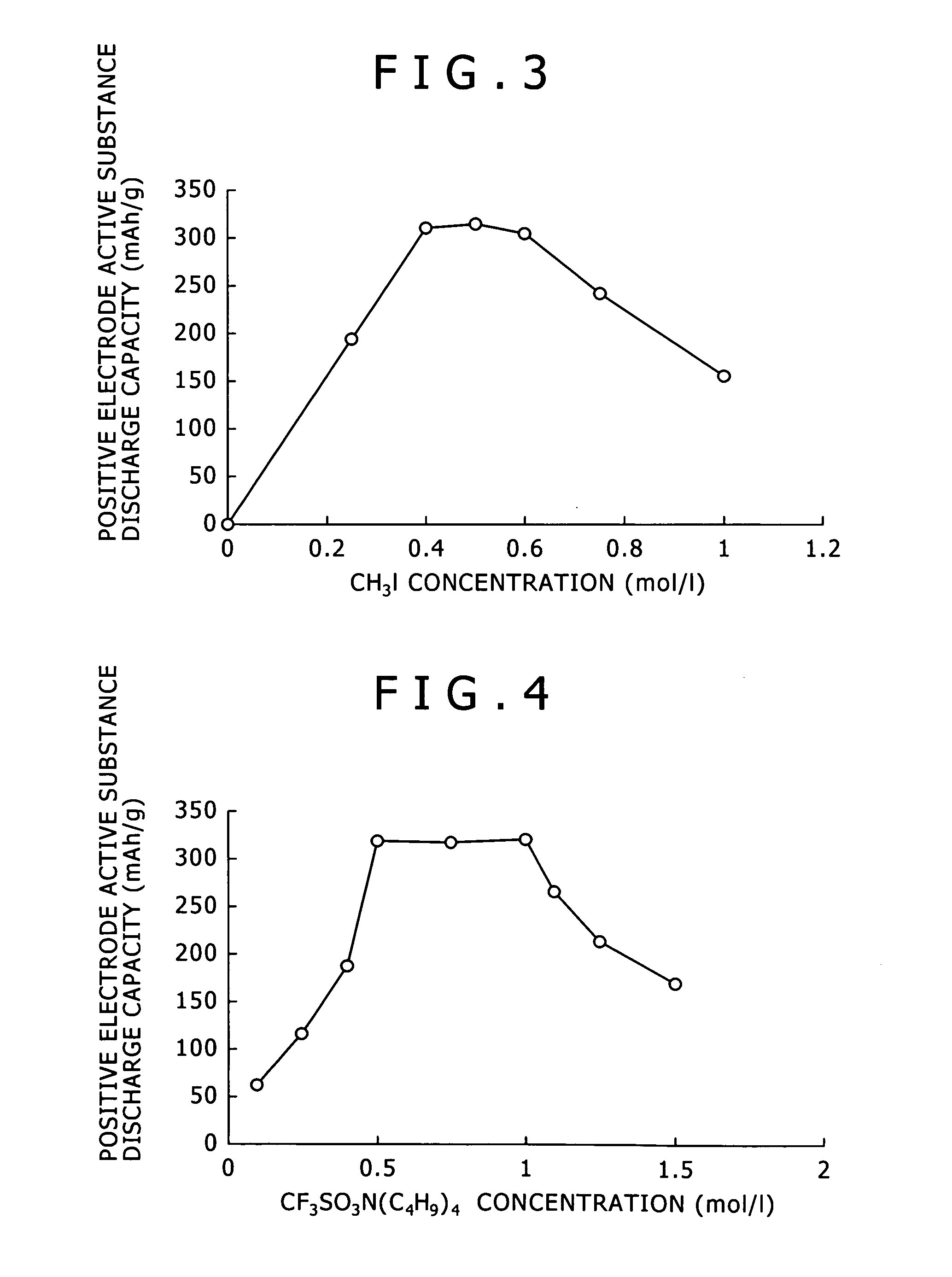Magnesium ion-containing non-aqueous electrolyte and a production process thereof, as well as electrochemical device
a non-aqueous electrolyte, magnesium battery technology, applied in the direction of non-aqueous electrolyte cells, cell components, electrical equipment, etc., can solve the problems of difficult to manufacture magnesium batteries in dry rooms, difficult to make magnesium batteries into actual products, etc., to achieve easy administration of starting materials, simple and convenient, and the effect of facilitating production
- Summary
- Abstract
- Description
- Claims
- Application Information
AI Technical Summary
Benefits of technology
Problems solved by technology
Method used
Image
Examples
example 1
[0063]In Example 1, the coin shaped magnesium battery 10 explained with reference to FIG. 1 in the preferred embodiment was manufactured by using metal magnesium as a negative electrode active substance, manganese oxide as a positive electrode active substance and the electrolyte according to the embodiment of the present invention as the electrolyte, and the performance of the electrolyte according to the embodiment of the present invention was investigated.
[0064]Metal magnesium Mg was added to 1,2-dimethoxyethane: CH3OCH2CH2OCH3 and they were reacted. Further, iodomethane: CH3I, aluminum chloride: AlCl3, and tetrabutyl ammonium trifluoromethane sulfonate: CF3SO3N(C4H9)4 were added to prepare a mixture formed by adding Mg at a ratio of 0.50 mol / l, CH3I at a ratio of 0.50 mol / l, AlCl3 at a ratio of 0.50 mol / l, and CF3SO3N(C4H9)4 at a ratio of 0.50 mol / l to 1,2-dimethoxymethane.
[0065]By applying a heating treatment at 60° C. while stirring them, a non-aqueous electrolyte 7 in which m...
example 2
[0078]In Example 2, the concentration of aluminum chloride: AlCl3 was changed in a range from 0.25 to 1.50 mol / l. Except for the foregoings, magnesium batteries 10 using the electrolyte according to the embodiment of the present invention were manufactured and a discharge test was conducted on them in the same manner as in Example 1. Table 2 shows the obtained discharge capacity.
TABLE 2QuaternaryMgCH3IAlCl3saltHeatingDischargeconcentrationconcentrationconcentrationconcentrationtemperaturecapacityBattery(mol / l)(mol / l)(mol / l)(mol / l)(° C.)(mAh / g)Example0.500.500.250.5060136.52-1Example0.40192.32-2Example 10.50298.9Example0.75305.02-3Example0.90311.82-4Example1.00317.92-5Example1.10271.02-6Example1.25219.92-7Example1.50155.72-8
[0079]FIG. 2 is a graph showing a relation between the concentration of AlCl3 used for the synthesis of the electrolyte and the discharge capacity of the magnesium battery in Example 2. As can be seen from Table 2 and FIG. 2, the electrolyte synthesized in Example...
example 3
[0080]In Example 3, the concentration of methane iodide: CH3I was changed in a range from 0 to 1.00 mol / l. Except for the foregoings, magnesium batteries 10 using the electrolyte according to the embodiment of the present invention were manufactured and a discharge test was conducted on them in the same manner as in Example 1. Table 3 shows the obtained discharge capacity.
TABLE 3MgCH3IAlCl3Quaternary saltHeatingDischargeconcentrationconcentrationconcentrationconcentrationtemperaturecapacityBattery(mol / l)(mol / l)(mol / l)(mol / l)(° C.)(mAh / g)Example 3-10.500.001.000.50600.0Example 3-20.25194.5Example 3-30.40312.4Example 2-50.50317.9Example 3-40.60305.9Example 3-50.75244.3Example 3-61.00154.0
[0081]FIG. 3 is a graph showing a relation between the concentration of CH3I used for the synthesis of the electrolyte and the discharge capacity of the magnesium battery in Example 3. As can be seen from Table 3 and FIG. 3, the electrolyte synthesized in Example 3 is satisfactory as the electrolyte f...
PUM
| Property | Measurement | Unit |
|---|---|---|
| temperature | aaaaa | aaaaa |
| temperature | aaaaa | aaaaa |
| temperature | aaaaa | aaaaa |
Abstract
Description
Claims
Application Information
 Login to View More
Login to View More - R&D
- Intellectual Property
- Life Sciences
- Materials
- Tech Scout
- Unparalleled Data Quality
- Higher Quality Content
- 60% Fewer Hallucinations
Browse by: Latest US Patents, China's latest patents, Technical Efficacy Thesaurus, Application Domain, Technology Topic, Popular Technical Reports.
© 2025 PatSnap. All rights reserved.Legal|Privacy policy|Modern Slavery Act Transparency Statement|Sitemap|About US| Contact US: help@patsnap.com



